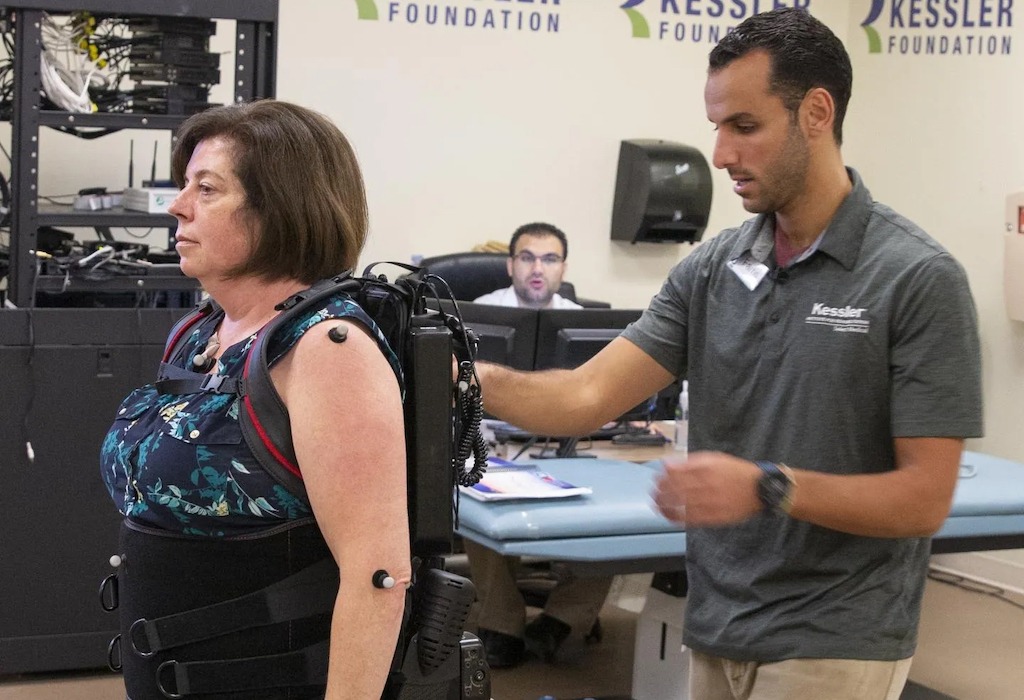
Robotic exoskeleton devices are already in use for patients with reduced mobility due to spinal cord injury, among other indications, but one new study suggests the physical therapy technique may help patients with Multiple Sclerosis (MS) too.
As a degenerative disease with no cure, treatments for MS tend to focus on stalling the progression of physical and mental symptoms, and that’s just what a team of experts from rehabilitation research charity Kessler Foundation found exoskeleton therapy could do in their pilot study.
The study represents the first randomised controlled trial of the effects of robotic-exoskeleton assisted exercise rehabilitation (REAER) on mobility, cognition, and brain connectivity in people with substantial MS-related disability.
“This is particularly exciting because therapy using robotic exoskeletons shows such promise for improving the lives of people with co-occurring mobility and cognitive disability, a cohort that likely has the greatest potential to benefit from this new technology,” said Dr. Androwis, lead author and research scientist in the Center for Mobility and Rehabilitation Engineering Research at Kessler Foundation.
“We’re eager to design a larger trial to further study these effects. Based on our initial results, we’re optimistic that this approach may be superior to the current standard of care.”
The results of the pilot study have been published in the journal Multiple Sclerosis and Related Disorders.
How does MS cause physical and mental impairments?
It’s common for people with MS to experience impairments in both mobility and cognition, and few therapies exist to manage the range of debilitating symptoms.
This lack of treatment options is a major problem for people with MS, especially those with substantial MS-related neurological disability.
Previous research shows that exercise rehabilitation, such as walking, is an effective approach to symptom management, with some research suggesting that even a single exercise rehabilitation intervention can improve both mobility and cognition.
Yet there is a lack of efficacy of exercise rehabilitation on mobility and cognitive outcomes in people with MS who have substantial disability.
Adaptive exercise rehabilitation approaches such as body-weight supported treadmill training and robot-assisted gait training have not demonstrated convincing results.
Moreover, adaptive interventions lack key interactions between patients and therapists that may improve efficacy.
What did the Kessler study on exoskeleton physical therapy show?
In the pilot study ran by Kessler scientists, 10 participants with significant MS-related neurological disability underwent physical therapy with a robotic exoskeleton – the Ekso NR made by Ekso Bionics – to manage their symptoms.
The device itself is made out of aircraft aluminium and carbon fibre, and powered by two sets of long-lasting lithium ion batteries to allow for continuous use.
Rehabilitation exercise using robotic exoskeletons is a relatively new approach that enables participants to walk over ground in a progressive regimen that involves close engagement with a therapist.
As compared to conventional gait training, REAER allows participants to walk at volumes needed to realise functional adaptations, via vigorous neurophysiological demands, that lead to improved cognition and mobility.
Effects on brain activity patterns were studied using the functional MRI capabilities of the Rocco Ortenzio Neuroimaging Center at Kessler Foundation.
Investigators compared participants’ improvement after four weeks of REAER vs four weeks of conventional gait training, looking at functional mobility, walking endurance, cognitive processing speed, and brain connectivity.
The results were positive: Relative to conventional gait training, four weeks of REAER was associated with large improvements in functional mobility, cognitive processing speed, and brain connectivity outcomes – most significantly between the thalamus and ventromedial prefrontal cortex.
“Four weeks is relatively short for an exercise training study,” said Dr. Sandroff, senior research scientist at Kessler Foundation and director of the Exercise Neurorehabilitation Research Laboratory.
“Seeing improvements within this timeframe shows the potential for exercise to change how we treat MS.
“Exercise is really powerful behaviour that involves many brain regions and networks that can improve over time and result in improved function.”






